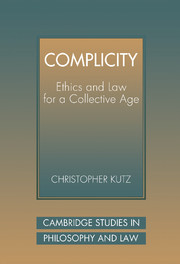Book contents
- Frontmatter
- Contents
- Acknowledgments
- 1 Introduction
- 2 The Deep Structure of Individual Accountability
- 3 Acting Together
- 4 Moral Accountability and Collective Action
- 5 Complicitous Accountability
- 6 Problematic Accountability: Facilitation, Unstructured Collective Harm, and Organizational Dysfunction
- 7 Complicity, Conspiracy, and Shareholder Liability
- 8 Conclusion: Accountability and the Possibility of Community
- Notes
- Bibliography
- Index
1 - Introduction
Published online by Cambridge University Press: 18 March 2010
- Frontmatter
- Contents
- Acknowledgments
- 1 Introduction
- 2 The Deep Structure of Individual Accountability
- 3 Acting Together
- 4 Moral Accountability and Collective Action
- 5 Complicitous Accountability
- 6 Problematic Accountability: Facilitation, Unstructured Collective Harm, and Organizational Dysfunction
- 7 Complicity, Conspiracy, and Shareholder Liability
- 8 Conclusion: Accountability and the Possibility of Community
- Notes
- Bibliography
- Index
Summary
We live in a morally flawed world, one full of regrets and reproaches. Some of the things we regret, or for which we are reproached, we bring about intentionally and on our own. But our lives are increasingly complicated by regrettable things brought about through our associations with other people or with the social, economic, and political institutions in which we live our lives and make our livings. Try as we might to live well, we find ourselves connected to harms and wrongs, albeit by relations that fall outside the paradigm of individual, intentional wrongdoing. Here are some examples: buying a table made of tropical wood that comes from a defoliated rain forest, or owning stock in a company that does business in a country that jails political dissenters; being a citizen of a nation that bombs another country's factories in a reckless attack on terrorists, or inhabiting a region seized long ago from its aboriginal occupants; helping to design an automobile the manufacturer knowingly sells with a dangerously defective fuel system, or administering a national health care bureaucracy that carelessly allows the distribution of HIV-contaminated blood. Although in each of these cases we stand outside the shadow of evil, we still do not find the full light of the good. Even individual acts of violence are characterized by a whole spectrum of relations between agents and harms, doers and deeds. Consider the burglar whose partner violates the understanding that there will be no violence during a robbery, or the members of a military firing squad, each eased in his conscience by the knowledge that one of them – it could be any – has been distributed a blank cartridge.
- Type
- Chapter
- Information
- ComplicityEthics and Law for a Collective Age, pp. 1 - 16Publisher: Cambridge University PressPrint publication year: 2000

